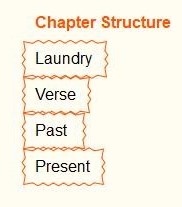It has been over a month since I began drafting my next book. As of this moment, the draft sits at just over 15,000 words. I expect the finished result to end up somewhere around 40,000 words. I’m happy with my progress, but I still have a way to go.
Today, I want to share a little bit about both the process of writing and the effect that this particular project is having on me.
How to Build a Book
Some people think that writing a book means starting at page one and continuing until page The End. People who think this have never written a book. Every writer has their own preferred methodology, but few actually write straight through from start to finish.
As a relatively new writer, I am discovering that my process varies wildly depending on the nature of my project. I am more of a “pantser” (a writer who flies by the seat of the pants) than a “plotter,” so whatever outline I bring to the drafting table is going to be minimalist and fairly loose. From there, the needs of the book determine my writing approach.
When I wrote my novel Coin and Dagger, I started with what would eventually become Chapter 16. Why? Because prior to drafting, I read Write Your Novel from the Middle by James Scott Bell, and I found his argument for this approach compelling. In hindsight, he was right and I ended up with a better story structure than I would have had I started with Chapter 1.
When I wrote Preparing for Jesus, I wrote each devotional individually, as the text and the Spirit inspired me, and then I assembled the individual pieces and added the introduction.
The Work in Progress
In my previous entry, I shared the general premise of my upcoming book. Using Philippians 1:3-11, I’m writing about koinonia, the rich and profound Christian practice of community and partnership. I am also writing about my thirteen years of marriage to Angela, my outlook on this new season of my life, and of course, my challenges with all things laundry-related.
Assembling the Pieces
You might recall seeing this bit tucked into the corner of an image in my previous entry:

Each of the book’s six main chapters follows this flow. For drafting purposes, I decided to try laying down tracks across all six chapters. I thought working on like sections as a group would enable me to maintain a specific mode of thinking across the set. So far, this approach is proving helpful.
I started with the laundry stories. This allowed me to turn on the humor, mix in a little self-deprecation, and gain some momentum before dealing with more somber matters.
Next, I transitioned to expositing the Philippians passage, verse by verse. This is a different kind of writing than the first track. It resembles sermon preparation more than drafting a book. Now, with five of six sections of this track laid down, I have at least two sermons worth of exposition ready.
I don’t wish to scare any prospective readers. So let me assure you that these sections are spread across the main chapters. I am not asking anyone to read a whole sermon (or two) all at once.
The next track will be different still. The third track is about my time with Angela, and about how God built our koinonia and put us to use for His kingdom. But let me pause here to share some observations about the impact this process is having on me.
Two Notable Effects
As I work through the separate tracks of this project, I’m discovering that each track prepares me for the next one. Part of this is by design since I build transitions into the end of each section. When I am ready to resume a chapter on the next track, I can reread earlier sections and have a jumping-off point.
However, there are also two not-so-expected—but helpful—effects.
Memories
As I write, I continue to unlock more memories, some even from my earliest days with Angela. Of course, recalling latent memories is not a complete surprise. What strikes me is the nature of these memories. Sometimes they relate to laundry, but more often, they center on what I’m drawing from scripture verses.
This is good and I am certain that it is Spirit-fueled. After all, these memories often point to the ways that Angela served God’s kingdom with her unique gifts and how her partnership—our koinonia—encouraged and enhanced my own service.
It is right for me to feel this way about all of you, since I have you in my heart and, whether I am in chains or defending and confirming the gospel, all of you share in God’s grace with me. God can testify how I long for all of you with the affection of Christ Jesus. – Philippians 1:7-8 (NIV)
I have to keep a notepad handy as I write, since these pieces are exactly what I need to lay down the third track of this book. I also take these pieces as confirmation that God is driving this project.
Conviction
The second effect is more surprising than the first. As I dig deep into these nine verses of Philippians, I not only remember how this passage shaped our marriage, I also gain insight into how I can live these verses now. This will be the essence of track four.
It’s convicting because I know I have been doing less since Angela left this earth. But it’s conviction that motivates, not conviction that leads to guilt and despair. The Lord has indeed given me a season of rest in my time of grief. Yet He is also preparing more work for me, which starts—but does not end—with this book.
I welcome the way the Spirit is speaking to me. I need it. Track four will cover a season that has hardly begun. When I write about moving forward, it will not be with five, ten, or twenty years of widower’s life in the rearview mirror. Instead, I will be journaling this phase of the journey as it happens, so readers can join me in near real time.
Compelled to Action
Overall, drafting this book is quite motivating. Knowing that God is using my story—even as it unfolds—keeps me moving forward. I’m still walking, not running, but at least with a little more vigor.
Sometimes the action that God spurns is small, but sometimes small is all we need. For example, last weekend a particular friend who I hadn’t seen in a couple of months kept coming to mind. I could easily make a mental note to check in with him and perhaps find time to meet for coffee.
Instead, having unpacked so much scripture and so many memories of Angela in recent weeks, those thoughts quickly turned to “perhaps I should take a minute to pray for him.” I’m pretty sure I heard that suggestion in Angela’s voice.
After two days of these stop-and-pray moments, I finally sent him a text and asked how I could pray for him. He responded, and the exchange also provided an open door for me to share my prayer needs with him.
There is nothing earth-shattering or deeply profound about this little exchange. But I share it because a month ago, I wouldn’t have done this. Yet, it was behavior that came naturally to Angela.
As I move forward into this new season, I pray that God will continue to open up more of these koinonia moments. Not just for the sake of my book, but for the sake of His kingdom. And as always, I welcome your prayers as well.




One comment on “Laying Track”